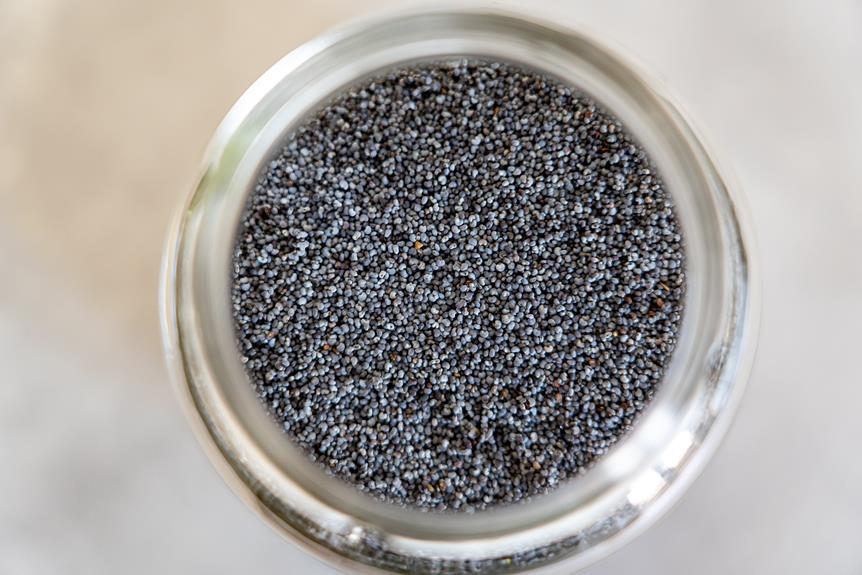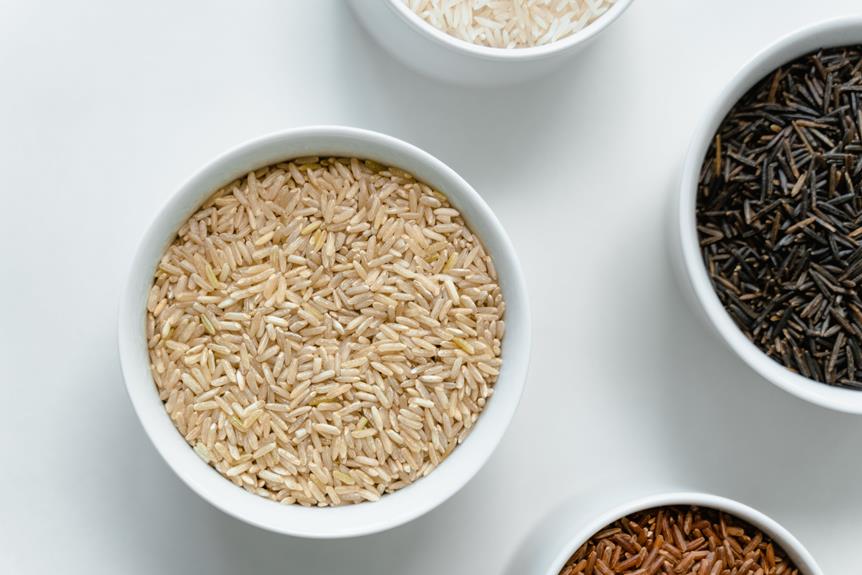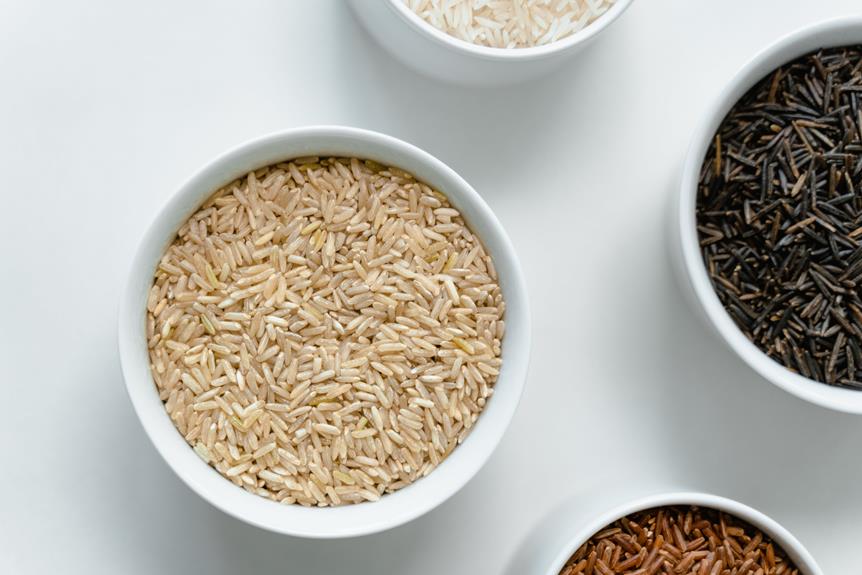You've probably experienced the discomfort of constipation at some point in your life. It's frustrating, and you're left searching for a solution. Well, have you ever considered the role that dietary fiber plays in alleviating this common problem? Understanding how fiber works in your body can provide valuable insights into why it's so effective in promoting regular bowel movements. But that's not all – there's more to this story. So, let's explore the fascinating world of dietary fiber and how it can bring relief to your digestive system.
Key Takeaways
- Dietary fiber promotes regular bowel movements and prevents constipation by adding bulk to stool and stimulating intestinal muscles.
- Soluble fiber, found in foods like fruits and vegetables, forms a gel-like substance that softens stool and aids in its passage.
- Gradually increasing fiber intake and staying hydrated are essential for alleviating constipation and improving digestive health.
- Including high-fiber foods like whole grains and legumes in your diet supports digestive health and helps prevent constipation.
What Is Dietary Fiber?
Dietary fiber, often called roughage, is a vital component of a healthy diet. It refers to the indigestible parts of plant foods that pass through our digestive system relatively intact. Unlike other nutrients, such as proteins, fats, and carbohydrates, dietary fiber cannot be broken down by the enzymes in our body. Instead, it remains undigested and adds bulk to the waste products that pass through our intestines.
There are two main types of dietary fiber: soluble fiber and insoluble fiber. Soluble fiber dissolves in water and forms a gel-like substance in our digestive system. It can be found in foods like oats, barley, lentils, apples, and citrus fruits. Insoluble fiber, on the other hand, does not dissolve in water and adds bulk to our stool. It can be found in foods like whole wheat, bran, nuts, and vegetables.
Both types of dietary fiber play important roles in maintaining our overall health. Soluble fiber helps to regulate blood sugar levels and lower cholesterol levels. It also promotes the growth of healthy bacteria in our gut. Insoluble fiber, on the other hand, helps to prevent constipation by adding bulk to our stool and speeding up its movement through the intestines.
Types of Dietary Fiber
To better understand the importance of dietary fiber, let's explore the different types of fiber that contribute to a healthy diet. Here are four types of dietary fiber that you should know about:
- Soluble Fiber: This type of fiber dissolves in water and forms a gel-like substance in your digestive system. It helps slow down the digestion process, making you feel fuller for longer. Soluble fiber can be found in foods such as oats, barley, legumes, and fruits like apples and oranges.
- Insoluble Fiber: Unlike soluble fiber, insoluble fiber does not dissolve in water. Instead, it adds bulk to your stool and helps promote regular bowel movements. Foods rich in insoluble fiber include whole grains, nuts, seeds, and vegetables like broccoli and carrots.
- Resistant Starch: This type of fiber resists digestion in the small intestine and reaches the colon intact. Once there, it acts as food for beneficial bacteria, promoting a healthy gut microbiome. Resistant starch is found in foods like green bananas, cooked and cooled potatoes, and legumes.
- Prebiotic Fiber: Prebiotic fiber is a type of fiber that nourishes the beneficial bacteria in your gut. It helps these bacteria produce short-chain fatty acids, which support gut health and contribute to overall well-being. Prebiotic fiber can be found in foods such as onions, garlic, leeks, asparagus, and chicory root.
How Fiber Promotes Regular Bowel Movements
Including an adequate amount of dietary fiber in your daily diet can help promote regular bowel movements. Fiber plays a crucial role in maintaining bowel regularity by adding bulk to your stool and improving its consistency. When you consume fiber-rich foods, such as fruits, vegetables, whole grains, and legumes, it passes through your digestive system relatively intact, acting like a sponge that absorbs water. This process softens the stool, making it easier to pass through the intestines and promoting regular bowel movements.
Moreover, fiber acts as a natural stimulant for the muscles in your intestines. It helps to increase the contractions, known as peristalsis, that move food through your digestive tract. These contractions help propel the stool forward, preventing it from becoming stagnant and leading to constipation. By promoting the rhythmic muscle movements in your intestines, fiber helps maintain a healthy and efficient digestive system.
In addition, certain types of fiber, called soluble fibers, have a unique ability to form a gel-like substance when they come into contact with water. This gel helps to soften the stool and adds bulk, making it easier for the intestines to push it along. Soluble fibers can also help regulate bowel movements by slowing down digestion, allowing for better absorption of nutrients and a more gradual release of waste.
It is important to note that while increasing fiber intake can promote regular bowel movements, it is essential to do so gradually and drink plenty of water. Rapidly increasing fiber intake without adequate hydration can actually worsen constipation. Aim to gradually increase your fiber intake over time and ensure you stay hydrated to reap the full benefits of fiber in promoting regular bowel movements.
Recommended Daily Intake of Fiber
To ensure optimal bowel health, it is important to understand the recommended daily intake of fiber. Fiber is an essential nutrient that plays a crucial role in maintaining regular bowel movements. It adds bulk to the stool, softens it, and helps it pass through the digestive system more easily. Here are four key points to keep in mind about the recommended daily intake of fiber:
- Adults should aim to consume between 25-38 grams of fiber per day. This may vary depending on age, gender, and overall health. It is recommended to consult with a healthcare professional to determine the specific fiber needs for your body.
- Increase your fiber intake gradually. Suddenly increasing fiber intake can lead to bloating, gas, and stomach discomfort. To avoid these issues, add fiber-rich foods to your diet slowly and drink plenty of water to aid digestion.
- Choose a variety of high-fiber foods. There are two types of dietary fiber: soluble and insoluble. Soluble fiber dissolves in water and can be found in foods like oats, barley, fruits, and vegetables. Insoluble fiber does not dissolve in water and is found in foods like whole grains, nuts, and seeds. Including a mix of both types in your diet can provide optimal benefits.
- Be mindful of food processing. Processed foods often have lower fiber content compared to their whole food counterparts. Opt for whole grains, fresh fruits and vegetables, and legumes to increase your fiber intake.
Foods High in Fiber
Looking to add more fiber to your diet? There are plenty of fiber-rich food options to choose from. Not only do these foods help prevent constipation, but they also offer numerous health benefits such as improving digestion and promoting heart health. By increasing your fiber intake, you can enjoy better overall health and well-being.
Fiber-Rich Food Options
Consuming a variety of fiber-rich foods is essential for maintaining regular bowel movements and preventing constipation. Here are four fiber-rich food options that you can include in your diet:
- Fruits: Incorporate fruits like berries, apples, pears, and oranges into your daily routine. These fruits are not only delicious but also packed with fiber that can help soften your stool and promote regularity.
- Vegetables: Make sure to include vegetables such as broccoli, spinach, carrots, and Brussels sprouts in your meals. These veggies are not only rich in fiber but also provide essential vitamins and minerals for overall digestive health.
- Whole grains: Opt for whole grain options like whole wheat bread, brown rice, quinoa, and oats. These grains contain high amounts of fiber, which can add bulk to your stool and support healthy digestion.
- Legumes: Include legumes like lentils, chickpeas, black beans, and kidney beans in your diet. These protein-packed foods are an excellent source of fiber and can enhance bowel movements.
Health Benefits of Fiber
Incorporating fiber-rich foods into your diet not only helps prevent constipation but also offers numerous health benefits. Foods high in fiber provide a range of advantages for your overall well-being. Firstly, fiber can help promote healthy digestion by adding bulk to your stool and preventing digestive issues such as bloating and gas. It can also help regulate blood sugar levels by slowing down the absorption of sugar into the bloodstream. Furthermore, consuming fiber-rich foods can aid in weight management as they tend to make you feel fuller for longer, reducing the likelihood of overeating. Additionally, a high-fiber diet has been linked to a lower risk of heart disease, as it can help lower cholesterol levels. Lastly, fiber plays a crucial role in maintaining a healthy gut by nourishing the beneficial bacteria in your digestive system.
Increasing Fiber Intake
To increase your fiber intake, include a variety of high-fiber foods in your diet. Here are four options to consider:
- Fruits: Add more fruits like apples, pears, berries, and oranges to your daily meals. These fruits are not only delicious but also high in fiber.
- Vegetables: Incorporate a range of vegetables into your dishes, such as broccoli, Brussels sprouts, carrots, and sweet potatoes. These vegetables provide an excellent source of fiber.
- Whole grains: Swap refined grains for whole grains like oats, brown rice, quinoa, and whole wheat bread. These options are rich in fiber and can easily be incorporated into your meals.
- Legumes: Include legumes like lentils, chickpeas, black beans, and split peas in your diet. These legumes are not only packed with fiber but also offer a good source of protein.
Tips for Increasing Fiber Intake
Boost your fiber intake with these simple tips. Increasing your fiber intake can help alleviate constipation and promote a healthy digestive system. Here are some easy ways to incorporate more fiber into your diet:
| Food Group | Fiber-Rich Foods | Serving Suggestions |
|---|---|---|
| Fruits | Apples, berries, oranges | Snack on fresh fruits or add them to your morning cereal or yogurt. |
| Vegetables | Broccoli, carrots, spinach | Include vegetables in your main meals, such as stir-fries or salads. |
| Grains | Whole wheat bread, oatmeal, brown rice | Opt for whole grain options when choosing bread, pasta, and rice. Start your day with a bowl of high-fiber cereal or oatmeal. |
| Legumes | Lentils, chickpeas, black beans | Add legumes to soups, stews, and salads for an extra fiber boost. |
| Nuts and Seeds | Almonds, chia seeds, flaxseeds | Sprinkle nuts and seeds on top of salads or yogurt. Enjoy them as a crunchy snack. |
| Beverages | Water, herbal tea | Stay hydrated by drinking plenty of water throughout the day. Enjoy a cup of herbal tea for added variety. |
In addition to increasing your fiber intake, it is essential to drink enough water to help the fiber move through your digestive system smoothly. Aim to drink at least 8 cups of water per day. Start by gradually incorporating fiber-rich foods into your diet to prevent any discomfort. Remember to read food labels to determine the fiber content of packaged products. By following these tips, you can easily increase your fiber intake and improve your overall digestive health.
Frequently Asked Questions
Can Dietary Fiber Help With Weight Loss?
Dietary fiber can indeed help with weight loss. It adds bulk to your diet, making you feel fuller for longer and reducing overall calorie intake. Fiber-rich foods like fruits, vegetables, whole grains, and legumes are low in calories and high in nutrients. They also take longer to digest, keeping you satisfied and preventing overeating. Additionally, fiber helps regulate blood sugar levels and improves digestion, promoting a healthy weight. So, incorporating more fiber into your diet can be beneficial for weight management.
What Are the Potential Side Effects of Consuming Too Much Fiber?
Too much fiber can have potential side effects on your digestive system. These can include bloating, gas, and abdominal discomfort. It may also lead to loose stools or diarrhea. It is important to gradually increase your fiber intake and drink plenty of water to help prevent these side effects. Remember to listen to your body and adjust your fiber intake accordingly.
Are All Types of Dietary Fiber Equally Effective in Alleviating Constipation?
Are all types of dietary fiber equally effective in alleviating constipation? It's a common question when it comes to finding relief. The good news is that different types of fiber can have varying effects. Some fibers, like insoluble fiber found in whole grains, can add bulk to your stool and help it move through your digestive system more easily. On the other hand, soluble fiber, like that found in fruits and vegetables, can absorb water and soften your stool. So, while all types of fiber can help, the effectiveness may depend on the specific type you choose.
Can Fiber Supplements Be Used as an Alternative to High-Fiber Foods?
Yes, fiber supplements can be used as an alternative to high-fiber foods. They provide a convenient way to increase your fiber intake and help alleviate constipation. However, it's important to note that while supplements can be effective, they may not provide the same benefits as a diet rich in natural, high-fiber foods. It's always best to aim for a balanced diet that includes a variety of fiber sources to ensure optimal digestive health.
Can Dietary Fiber Alleviate Symptoms of Other Digestive Disorders Besides Constipation?
Dietary fiber can indeed alleviate symptoms of other digestive disorders besides constipation. It has been shown to help with symptoms of irritable bowel syndrome (IBS), such as bloating and abdominal pain. Fiber adds bulk to the stool, making it easier to pass and reducing symptoms of diarrhea. It can also help regulate blood sugar levels in individuals with diabetes. So, incorporating fiber into your diet can have numerous benefits for your digestive health.




